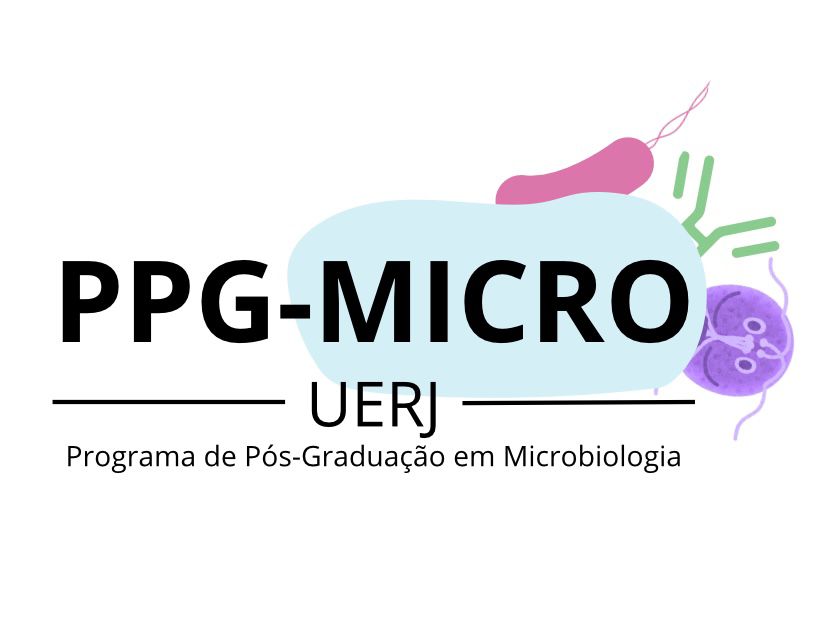English Version

A. Welcome
The Microbiology Postgraduate Program of the Universidade do Estado do Rio de Janeiro (PPG-MICRO) aims to train qualified master's and doctoral researchers in research and education. The program is designed for professionals from various fields in Biological and Health Sciences, including biologists, physicians, dentists, pharmacists, nurses, nutritionists, and veterinarians.
PPG-MICRO launched its Master’s program in 1994 and its Doctoral program in 2006. Over the four-year period (2021-2024), 33 students were admitted to the Master’s program and 20 to the Doctoral program. By early 2025, PPG-MICRO had 51 students enrolled, including 27 Master’s and 24 Doctoral candidates.
PPG-MICRO is structured into three research areas: (i) Immunology of Infectious and Parasitic Processes, (ii) Medical Bacteriology, and (iii) Medical Parasitology. Research in these areas employs advanced methodologies such as Cellular and Molecular Biology, Epidemiology, Biochemistry, and Bioinformatics while maintaining the traditional aspects of Parasitology. The program has also strengthened its focus on One Health, integrating human, animal, and environmental health perspectives into its research projects.
B. Research Lines and Ongoing Projects
The scientific research projects of PPG-MICRO address highly relevant and contemporary topics and are grouped into three primary research lines:
- Applied Microbiology: This research line includes epidemiological studies of infectious and parasitic processes, microbial genetics and physiology, bacterial antimicrobial resistance, and the role of bacteria, fungi, protozoa, and helminths in various contexts such as clinical, environmental, and food microbiology.
- Cellular Microbiology: Projects in this research line focus on molecular mechanisms that mediate host-pathogen interactions, including cellular signal transduction, inflammatory responses, apoptosis, and necrosis.
- Anti-infective Immunity: This research line covers projects investigating innate and acquired immune responses to infectious processes, antigenic determinants, and immune regulation mechanisms in response to pathogen-induced secretion or surface expression of host molecules.
Ongoing Research Projects
Currently, PPG-MICRO has 26 active research projects, distributed among the three research lines:
- Cellular Microbiology: 6 projects
- Applied Microbiology: 13 projects
- Immunology of Infectious and Other Processes: 7 projects
Cellular Microbiology
- Analysis of cellular components of Streptococcus agalactiae required during sepsis, blood-brain barrier invasion, and meningitis
- Biochemical aspects of the trypanosomatid-host cell relationship
- Cellular, ultrastructural, and molecular aspects involved in the mechanisms of adherence, internalization, and cytotoxicity of enteroaggregative Escherichia coli (EAEC) in intestinal cells of human and animal origin
- Antiparasitic and immunomodulatory activity of plant-derived and synthetic substances
- Biological characterization and interaction with eukaryotic cells of Corynebacterium diphtheriae and other Gram-positive pathogens: influence of genetic diversity, glycoconjugates, and iron-dependent proteins
- Biofilm formation by group B streptococci: apoptosis induction and the role of the PI3/AKT pathway and reactive oxygen species
Applied Microbiology
- Cellular, ultrastructural, and molecular aspects of pathogens and parasite-host interactions
- Microbiological aspects and virulence of microorganisms isolated from the oral cavity and respiratory tract
- Microbiological, immunological, clinical, molecular, and epidemiological aspects of diphtheria and infectious processes caused by medically relevant coryneform microorganisms
- Morphological, biological, and stereological characteristics of helminth parasites of vertebrates
- Health education in infectious-parasitic diseases: prevention workshops, nutritional aspects, development of educational materials, and refresher courses
- Pathogenesis study of enteroaggregative Escherichia coli (EAEC) using an interaction model with Caenorhabditis elegans
- Studies of pathogens involved in hospital infections: antimicrobial resistance, molecular epidemiology, and technological development aspects
- Antimicrobial resistance markers, genetic diversity, and virulence attributes in Gram-negative bacilli isolated from cystic fibrosis patients and hospital environments
- Epidemiological markers and virulence factors in Enterococcus and other medically relevant Gram-positive cocci
- Occurrence, virulence, and antimicrobial resistance in enterobacteria and Staphylococcus strains isolated from clinical samples, water, and food
- Trichuris muris parasitism in mice as a study model for human/veterinary trichuriasis and integrated taxonomy of helminths
- Virulence properties, genetic, and molecular analysis of enteroaggregative Escherichia coli (EAEC) and uropathogenic Escherichia coli (UPEC)
- Methicillin-resistant Staphylococcus aureus (MRSA): occurrence of community-acquired MRSA (CA-MRSA) strains in hospitalized patients and cystic fibrosis patients
Immunology of Infectious and Other Processes
- Study of the inflammatory response in infectious and non-infectious diseases
- Identification of immunological markers in patients who develop hypersensitivity reactions due to deficiencies in the regulatory mechanisms of autoimmune, allergic, and chronic viral infectious diseases
- Impact of different stress neuromediators on the activation and differentiation of T lymphocytes
- Immunobiology of HIV infection
- Gene regulation mechanisms in pathogen-host interaction
- New diagnostic perspectives in COVID-19: an approach based on antigen-specific cellular immune response
- Response to vaccination against Neisseria meningitidis serogroup C: functional antibodies and cellular immunity in HIV-infected children
Faculty and Research Supervision
PPG-MICRO currently has 20 permanent faculty members and 2 collaborating researchers, with expertise spanning bacteriology, parasitology, and immunology. Faculty members are actively involved in national and international collaborations, including partnerships with institutions in the United States, the United Kingdom, Germany, Argentina, and Brazil.
Research Lines and Associated Researchers
-
Applied Microbiology
-
Cellular Microbiology
- Focus: Molecular mechanisms of host-pathogen interactions, signal transduction, inflammatory responses, and apoptosis.
- Researchers:
-
Anti-infective Immunity
- Focus: Immune responses to infections, antigenic determinants, and immune regulation.
- Researchers:
Several faculty members secured research funding through competitive grants from agencies such as CAPES, CNPq, FAPERJ, and FINEP, supporting projects on antimicrobial resistance, infectious disease epidemiology, and experimental models of host-pathogen interaction.
PPG-MICRO continues to emphasize the integration of graduate education with undergraduate training and public outreach, fostering interdisciplinary approaches and promoting scientific excellence in microbiology and infectious disease research.


